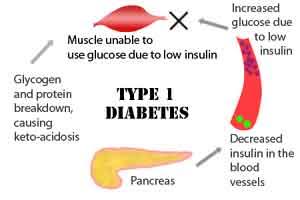- Home
- Editorial
- News
- Practice Guidelines
- Anesthesiology Guidelines
- Cancer Guidelines
- Cardiac Sciences Guidelines
- Critical Care Guidelines
- Dentistry Guidelines
- Dermatology Guidelines
- Diabetes and Endo Guidelines
- Diagnostics Guidelines
- ENT Guidelines
- Featured Practice Guidelines
- Gastroenterology Guidelines
- Geriatrics Guidelines
- Medicine Guidelines
- Nephrology Guidelines
- Neurosciences Guidelines
- Obs and Gynae Guidelines
- Ophthalmology Guidelines
- Orthopaedics Guidelines
- Paediatrics Guidelines
- Psychiatry Guidelines
- Pulmonology Guidelines
- Radiology Guidelines
- Surgery Guidelines
- Urology Guidelines
Blocking a hormone may help treat type 1 diabetes: Study

Geneva : Blocking the hormone that raises sugar levels in the blood could increase insulin levels while keeping blood sugar levels down, which may help treat type 1 diabetes, a new study has found.
The findings point to a novel way to treat diabetes but only in some patients, researchers said.
"Inhibiting the hormone glucagon has recently been explored as an alternative or supplement to insulin injection, but it has limitations," said Pedro Herrera from the University of Geneva.
"Our research reveals why the body needs to have some residual insulin production in order for a treatment blocking glucagon to work," said Herrera.
Other recent studies have suggested that diabetes is caused solely by an excess of glucagon rather than a deficiency of insulin.
These studies found that blocking glucagon prevents excessively high blood glucose levels, despite a complete lack of insulin.
They suggested that blocking glucagon rather than regularly injecting insulin could be a treatment for hyperglycemia.
However, the current findings indicate that the models used were not totally lacking in insulin and that just blocking glucagon was only effective if some insulin was still being produced.
For the new research, scientists used transgenic mice in which insulin could be more efficiently eliminated. These mice became severely diabetic.
Around three quarters of patients with type 1 diabetes possess a small number of the beta cells needed to produce insulin. In these patients, blocking glucagon, in addition to insulin replacement, could help keep blood sugar levels in check.
It could also result in some glucagon-producing alpha cells converting into beta cells and producing more insulin.
Sugar accumulates in the blood after a meal, triggering the release of insulin from the pancreas to allow tissues to use and store it. During fasting or exercising, glucagon is released and opposes the action of insulin, researchers said.
The balance between the two pancreatic hormones keeps blood sugar levels steady, they said.
Using insulin therapy and blocking glucagon as a combined treatment could in some cases provide a more effective and safer way to maintain a healthy balance and avoid the peaks and troughs of blood sugar levels, researchers said.
The findings were published in the journal eLife.

Disclaimer: This site is primarily intended for healthcare professionals. Any content/information on this website does not replace the advice of medical and/or health professionals and should not be construed as medical/diagnostic advice/endorsement or prescription. Use of this site is subject to our terms of use, privacy policy, advertisement policy. © 2020 Minerva Medical Treatment Pvt Ltd